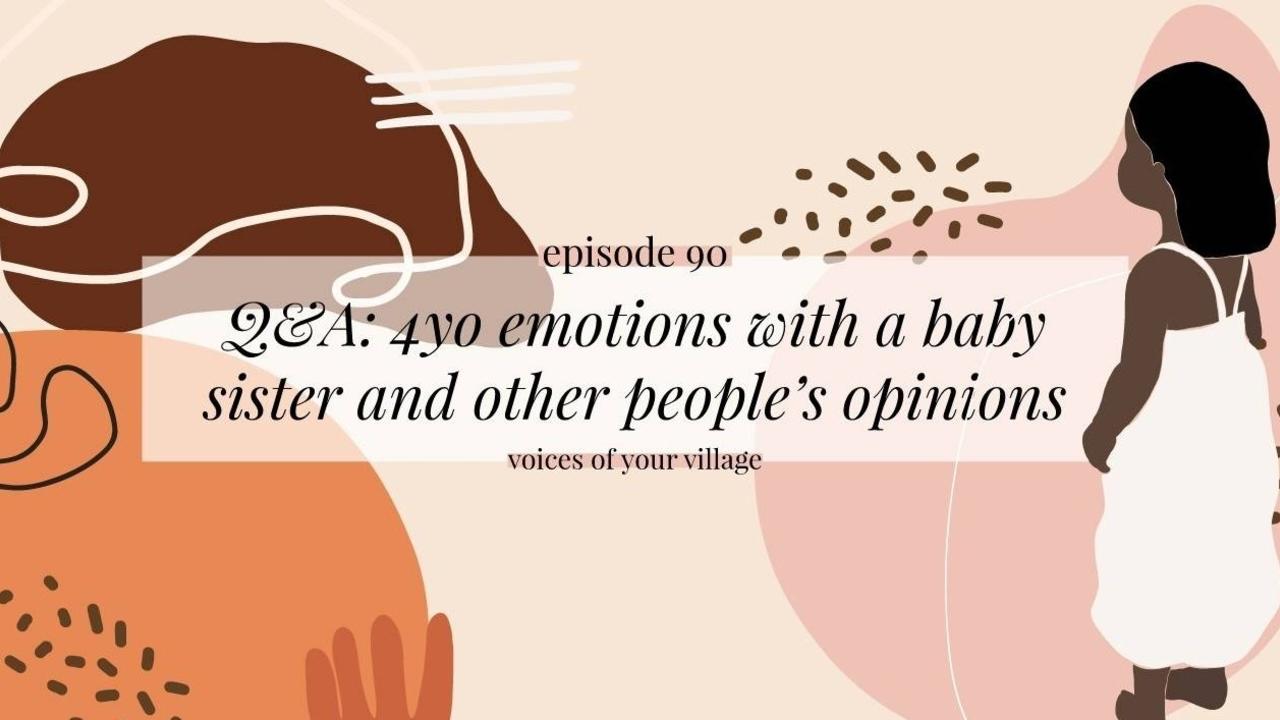Q&A Series: 4yo emotions with a baby sister and other people's opinions

Happy Pod Day! Today we are diving right on into a new Q&A Series with Julie. Julie lives in Manchester, New Hampshire with her husband of 6 years and their two sweet kiddos, four-year-old Brady and three-month-old Morgan (who you can hear happily chattering away in the background! Hi Morgan!)
Julie opens the episode by expressing concern over daily transitions with her two kids, especially daycare pickups for Brady. She wonders why his mood seems to change when she goes to pick him up after school, and how consistency can be accomplished within a busy schedule.
Julie’s family is already aiding transitions with the use of visual tools, a great start that cannot be understated, but we can always incorporate more. In addition to existing expressive visual aids that help with processing, what your kiddo is feeling and expecting, it is also useful to integrate a calendar-style visual aide where he can clearly see what it is about his day that is going to change (such as which parent will be doing the pick-up.)
We as adults use visual aides all the time and for kids we expect them to remember on their own, which can be overwhelming. So anytime we bring in a visual aide, it can be really helpful.
What I often hear from families is, “I want my kids to have flexibility, what if something changes?” But the cool thing about these schedules is that you can say to your tiny human, “We had so much fun at the playground, we stayed longer than we thought we would and now have to look at our schedule and make some changes.” And then we can make those changes together.
Julie went on to question if she made the right choice in being emotionally vulnerable in front of her four-year-old. And by taking deep breaths and telling him that she was feeling sad, she made the right choice. Modeling behavior is huge. We can tell kiddos about coping strategies all day long but if we get stressed and yell, they aren’t going to listen next time we tell them to take deep breaths.
It’s totally fine for your kiddo to know that you’re sad and you’re taking deep breaths and if he says, “Why are you sad?” You can say, “Sometimes it’s really frustrating when you are having a hard feeling and I don’t know how to help you.”
Julie then moved on to a question about co-parenting: I’ve had a more flexible schedule this summer, being on maternity leave, so I have had time to join the Seed and Sew village to learn more. I’ve tried to pass that information along without being condescending while validating his feelings. How do I pass along all I have learned without him feeling like I am attacking his parenting?
Adults have feelings, too. It can feel like an attack sometimes to be presented with so much corrective information, what we don’t want is for your partner to feel like they aren’t a good parent. Anytime that we are addressing any conflict, or navigating hard feelings with our partner, we need to also be in a place where we can empathize as well. You can say, “I’ve been screwing this up a lot and this is what I’ve learned, what are your thoughts? What have you noticed? What’s working for you?”
There are a lot of gender differences, this isn’t black and white or all the time, but we do put a lot more pressure on moms to know about parenting than we do on dads.
So, part of this is taking that ownership by saying something along the lines of, “I’ve been checking out this podcast, I’d love it if you got on board with me here because I found it really helpful.” One of our favorite things about the Tiny Humans, Big Emotions membership is that it is a household membership, so it can be a shared account with your village.
I want to extend grace to the dudes in this situation because we as women have often been allowed to feel so many more things and so for us to go from here to the next step is a different journey than for dudes who have to build their own skillset because they weren’t allowed to for so long. Often this is coming from both a place of fear and disappointment. Disappointment at not already having these parenting tools, and fear of what this journey looks like down the road.
Every parent wants to do the best job that they can, and everyone is just working with a different toolbox.
Not even just our parenting toolbox, but our own emotional processing toolboxes as well. The ability to say or recognize, “Man, I’m feeling nervous about where this might go.” This really all starts with our own self-awareness. For guys, we just haven’t nurtured that. Also, they’re not consuming constant parenting tips in their media all day long like women are. When we are having these conversations with our partners I want to have awareness of that, and be in a place where we can empathize with it. Not from a, “I’m right and you’re wrong” place but instead a place of, “I also don’t totally know what I’m doing, this is what I’ve found helpful, let’s figure it out together.”
Thank you, Julie, for being in our village, and raising your sweet kiddos with such intention. If you are interested in being a potential Voices of Your Village podcast guest, fill out this form and we will be in touch if you’re selected!
